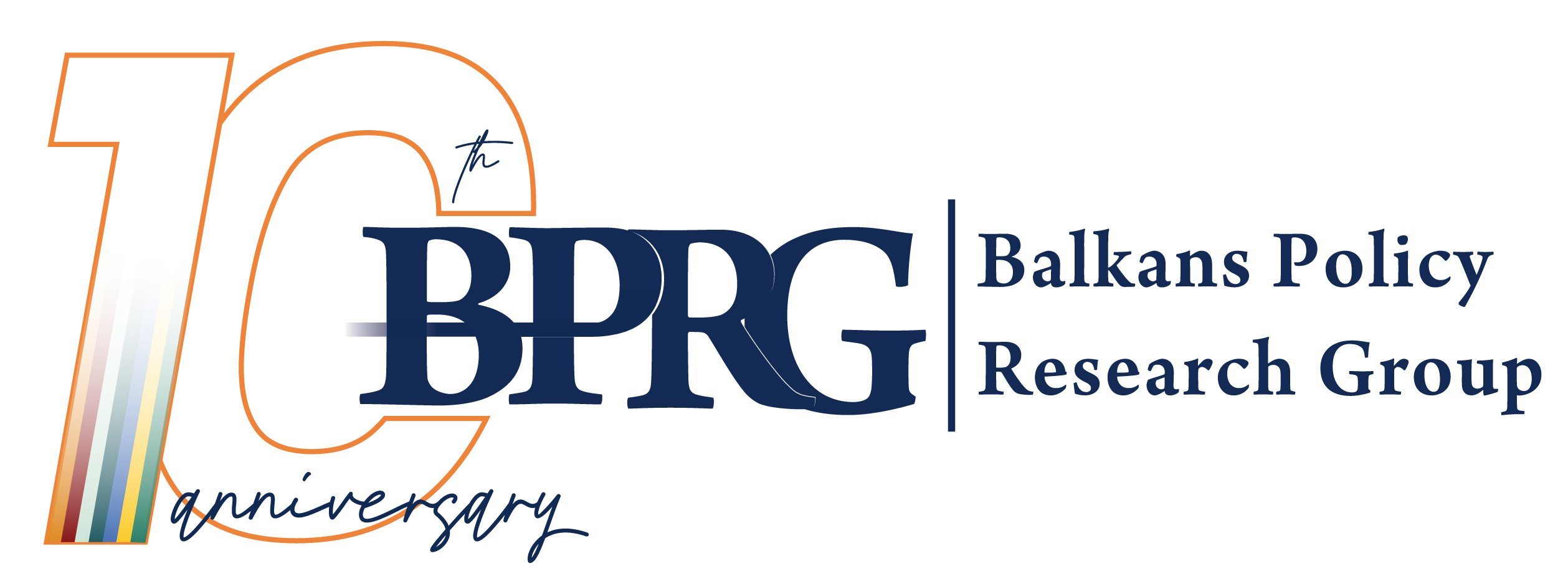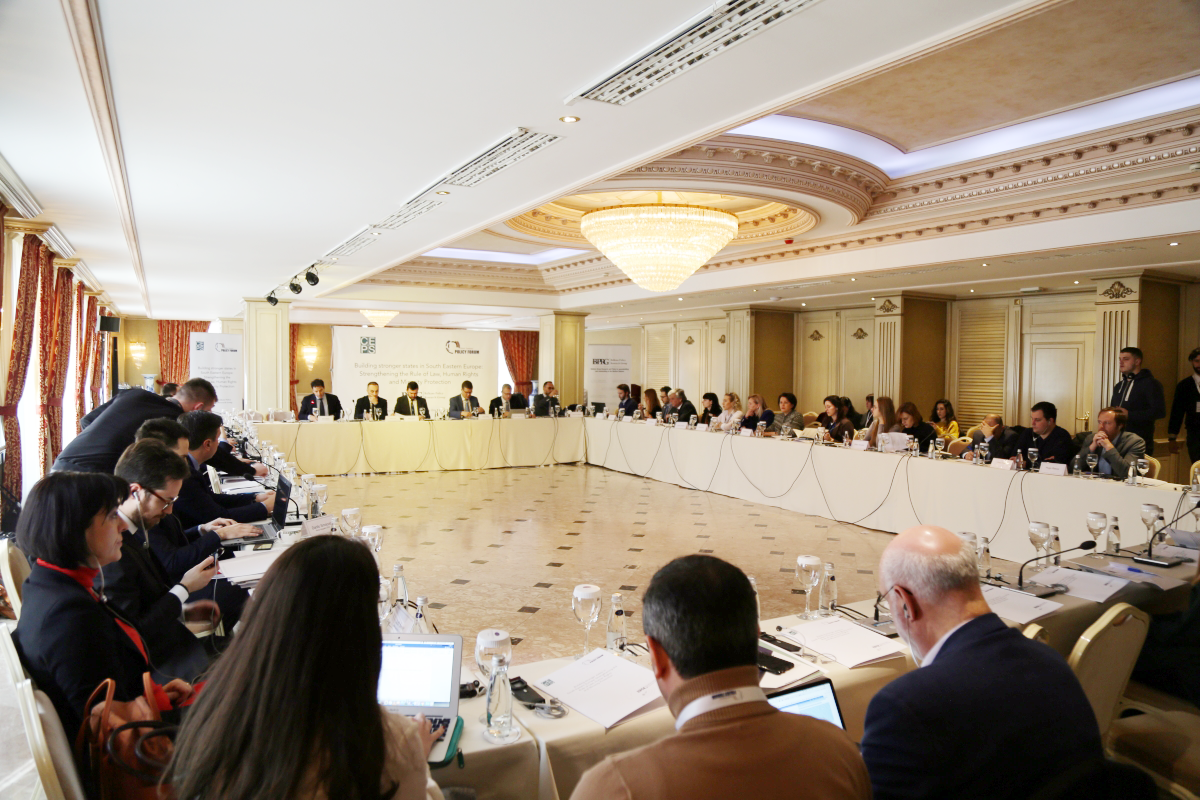7 February 2019 – Balkans Policy Research Group in cooperation with the Centre for European Policy Studies (CEPS) organised the conference “Building Stronger States in South Eastern Europe: Strengthening the Rule of Law, Human Rights and Minority Protection”.
In light of the newly launched Enlargement Strategy by the European Union for the Western Balkans, BPRG organised this conference with the purpose of addressing and encouraging debate on topics such as rule of law, fundamental rights and good governance as the utmost priorities for the Western Balkans progress toward EU membership.
The conference’s three panels on topics that covered the effectiveness of European Union policies for strengthening rule of law in the Western Balkans, rule of law challenges within the EU and the Roma policies from a rights and migratory perspective. The audience included representatives from academia, think tanks, policy making, civil society and universities. In addition to the contributors from CEPS, the conference also engaged different policy areas experts from Kosovo, Macedonia, Montenegro, Serbia, Hungary, Ukraine, Poland and Moldova.
The panels were designed as a means to bridge the gap between policy-making and expert opinion in order to thoroughly understand the mechanisms that drive policy-change. While CEPS researchers and fellows introduced a number of robust theoretical challenges to the policy framework, actors engaged in the policy-making, such as EU representatives, were able to share the practical implications of addressing policy issues.
In his opening remarks, Naim Rashiti, Executive Director of the Balkans Policy Research Group highlighted two critical challenges:
1. Western Balkans states and South Eastern European states continue to enhance communication and cooperation with the EU. However, there is a growing difference in understanding the achievements and standards. Governments of the aspiring countries believe that the EU does not value the progress and reforms that have been undertaken, which for the EU seems to be insufficient and often cosmetic. The two different interpretations are creating a new layer of confusion and risk becoming even greater in the context of the enlargement process for the Western Balkans.
2. The other challenge comes from within the EU. Unforeseen, and unseen before, the rapidly emerging regress in the area of rule of law, freedom of media and the fundamental rights within the EU, has uniquely disturbed the EU system of governance and vision, and it is reshaping the EU inside and in relation to the aspiring countries. These internal problems within the EU have not only seriously weakened the EU’s approach toward the others, but are also going to undermine the process of rapprochement. People of WB and neighbouring area are unaware of problems inside the EU and the impact they will have on their EU future. These two fundamental problems will drive the dynamics of EU integration and relations between the EU and South East Europe.
The panel on the Effectiveness of EU policies for strengthening the rule of law in the Western Balkans addressed some of the crucial issues with regard to the effectiveness of the EU policies for strengthening the rule of law in the Western Balkans as well as the accession process. Steven Blockmans, head of the EU Foreign Policy Unit at CEPS noted that “EU and member states are not leading by example; many individual countries are suffering from aspects of the wider rule of law being eroded”. In addition, Blockmans added “the EU diplomatic toolkit is weak on enforcing conditionality on rule of law issues”.
Artan Grubi, Chair of the EU Affairs Committee in the Republic of Northern Macedonia presented an overview of the country’s effort to start accessions talks and highlighted the role of the “EU as a compass that led to and promoted progressive forces within Northern Macedonia. The EU plays an integral role in the successful development of all the countries in South East Europe, where Northern Macedonia is a success story of EU reforms”.
Felix Rathje, representative of the EU Office in Kosovo however, noted that “progress can be made, but state capture can lead to backtracking, which in turn, explains how the overall progress has not been quite so fast in the enlargement process”. In addition, Mr. Rathje argued that it “ultimately requires ownership and leadership of the Western Balkans to deliver tough transformation”. He further stated that “EU tools are less blunt in Kosovo now at this stage of the process and that Kosovo can benefit from a reform agenda as an anchor for reform”.
Sergio Carrera, Senior Research Fellow and Head of the Justice and Home Affairs Units at CEPS, made a presentation on the Rule of Law Challenge in the EU. Mr. Carrera stated that “the EU has to work on its toolbox in addressing questions on Rule of Law and be more consistent in utilising them. It is in everyone’s interest that our governments comply with democracy, rule of law and fundamental rights”.
The panel on Rule of law erosion in Europe: Challenges and Responses enhanced discussions on what is happening inside the EU, in particular in Hungary and Poland and EU tools that address these challenges. Presentations focused on the rule of law challenges before and after accession, such as mutual trust in criminal justice, anti-corruption, freedom of the media, and the role of civil society actors. Contributions to this panel underlined how ensuring respect of the rule of law is a cross-cutting priority across a number of policy areas, bringing evidence from selected domains of EU cooperation.
Judit Bayer, Professor of Media and International Law at the Budapest Business School in Hungary, emphasised some of the key elements of state capture in Hungary including, “the use of state resources as party resources, transformation of the election code, destroyed constitutional structure of checks and balances, lack of judicial independence, nationalistic rhetoric, media propaganda which supports the government and governing party, and disinformation and hate speech against minorities, migrants and disadvantaged groups”.
Małgorzata Szuleka, Lawyer & Researcher from the Helsinki Foundation for Human Rights in Poland, noted that “EU oversight tools played an important role in provoking positive changes in the context of Polish rule of law erosion but at the same time, EU attempts to install a rule of law framework failed miserably, as there was virtually no commitment from the government”. She further stated that “CSOs played an integral role in protecting the constitution and the implementation of participatory democracy in Poland”.
Denis Cenusa, associated expert from Think Tank Expert-Group of Moldova, established that the EU toolbox in promoting “visa liberalisation conditionality directly led to the adoption of antidiscrimination legislature”.
The panel on Roma inclusion and migration: what role for the EU? focused on the Roma policies from a rights and migratory perspective, as well as the role of the EU in the promotion of inclusive policies.
Simonida Kacarska, director of the European Policy Institute in Skopje, pointed out that “minority rights remain a fundamental issue in the context of post-visa liberalisation challenges”. Mrs. Kacarska emphasised that “after visa liberalisation, state measures resulted in the highest number of citizens not being allowed to exit the country, almost everyone belonging to the Roma ethnicity”.
Danilo Smolovic, Policy Expert of Roma Integration 2020 in Serbia, highlighted the importance and the need of “having effective advocacy in establishing data on Roma population in order to address their needs and provide effective budgeting on Roma issues”.
Stefano Gnocchi, representative of the EU office in Kosovo, on the other hand, emphasised that “anti-gypsysim and economic hardship remain at the forefront of migratory shifts and European Parliament should think of a way of how it is going to address this in the future”.
Stephan Muller, External Advisor of the Central Council of German Sinti and Roma in Germany argued that it is important to acknowledge “anti-gypsyism as a root cause for discrimination and exclusion of Roma and migration is a direct consequence. Roma participatory and reintegration policies have to take into account combating anti-gypsysim in order to have a sustainable impact”.
The conference was organised in cooperation with Center for European Policy Studies and was part of the second edition of the ENGAGE Fellowship Programme, coordinated by CEPS with the support of the Open Society Initiative for Europe (OSIFE).



